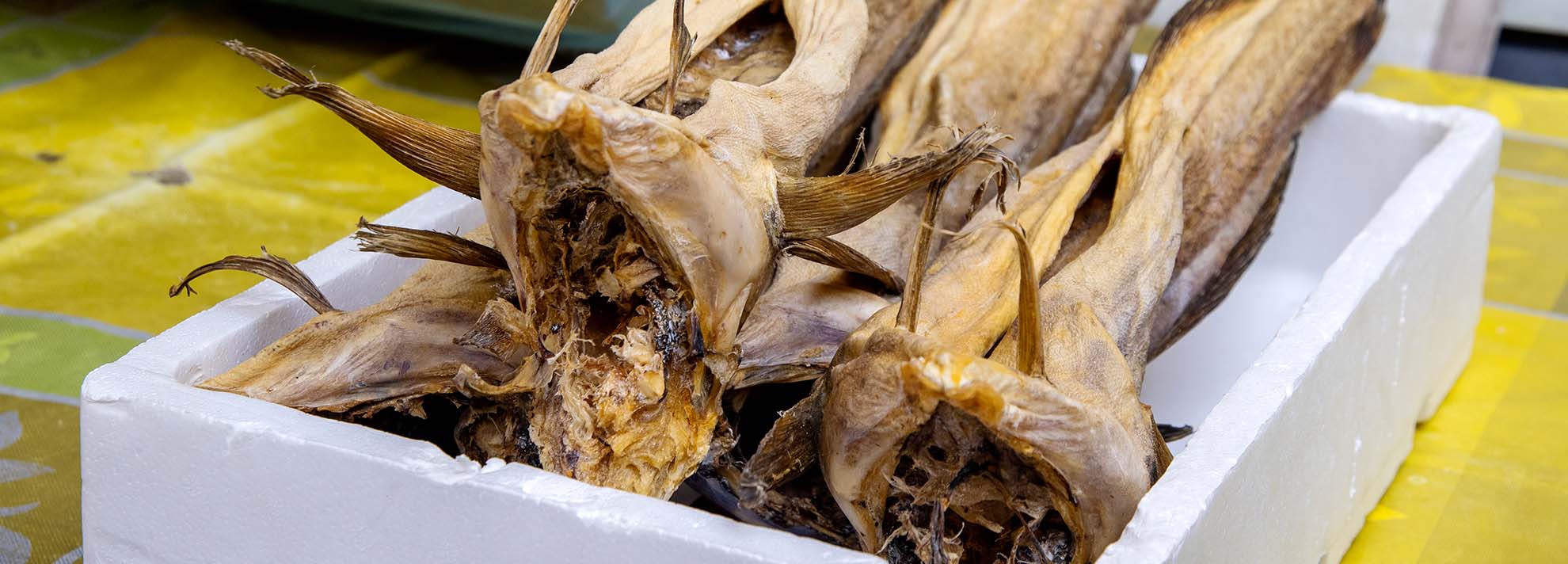From the Lofoten Islands to Liguria

“Stockfish”, the dried codfish that contributed to the history of Italian cuisine, is imported from Norway.
Its unmistakable and intense aroma (to speak of its perfume would really be a bit too much) wafts through the carruggi of Genoa. The large dried codfish, which in the eyes of all generations of children have certainly looked like scary and somewhat monstrous creatures, are peeping out of specialist shops.
Stockfish is processed using one of the oldest methods for preserving fish: drying.
Directly from the Lofoten Islands, located beyond the Arctic Circle, come the tastiest cod fishes which, after being exposed to the air for three months, are ready to be prepared according to the best Ligurian recipes.
Genoa and Venice. In the days of the Maritime Republics, they were enemies. They were waging war. Yet, it is thanks to a Venetian enemy of the Republic of Genoa if, in the city under the Lighthouse, stockfish is one of the most famous and most cooked dishes. Like pesto and focaccia.
The story began on a stormy day back in 1432: when the discovery of the Americas was still to come, the ships of the Maritime Republics were plying the oceans. Piero Querini, commander of a sailing ship of the Republic of San Marco, was far from home. Precisely off the shores of freezing Norway, just a stone’s throw from the Lofoten archipelago.
On a dark and stormy day, Querini had to face a very bad storm, with waves ten metres high. Even a good commander like him could not avoid the worst outcome. The crew shipwrecked on the Lofoten Islands, where they discovered stockfish: huge fishes hanging from large wooden cages. Querini returned to Venice and, from here, the Norwegian novelty soon spread to the sea towns that had trade relations with the Serenissima. Also because Querini, in one of the many battles against the Genoese people, was taken prisoner. Just as Marco Polo did, in the Genoese prisons he recounted his discovery. And so, because of that enemy’s adventure, for at least five centuries “stocco” fish has been one of the most loved dishes in Genoa.
“A cà m’aspetan” the stockfish’ poetry by Luigi Cornetto
Lé zà mézogiorno/ toulì/ o m’ha piggiòu d’asbrio/ me n’eo proprio ascordòo,/ sacranon/ ma comme se fa:/ piggia questo, posa quello,/ o telefono,/ vanni là, vegni in sa;/ con tutto sto remescio/ o tempo o passa/ sensa parlà. ‘Oua però/ me devo destrigà/ a cà m’aspetan,/ tanto pe rescioame/ m’han faeto…/ O stocche boggìo/ con tutto quello/ che ge veu…/ ‘Na tomata appenn-a strinà/ ‘n te l’aegua a-o boggio,/ dui spighi d’aggio/ ‘na preisa de porsemmao,/ euio, sa, limon/ e due patatte/ pe daghe ciù ton,/ un bon gianco de Liguria/ che ben o s’accompagna,/ dappeu, se peu incomensà./ Cae gente…/ che bon dinà!
They are waiting for me at home. It’s already noon/ here it is/ it caught me by surprise/ I had forgotten all about it,/ damn/ how is it possible:/ take this, put that down,/ the telephone,/ going up and down;/ with all this confusion/ time goes by/ without speaking. Now however/ I have to hurry home/ they are waiting for me,/ and to cheer me up/ they cooked…/ boiled stockfish for me/ with all/ the necessary ingredients../ One tomato seared/ in the boling water,/ two garlic cloves/ one pinch of parsley,/ oil, salt, lemon/ and two potatos/ to enrich it,/ a good Ligurian white wine/ which is a perfect accompaniment,/ and then we are ready to start,/ dear people… / what a great meal.



